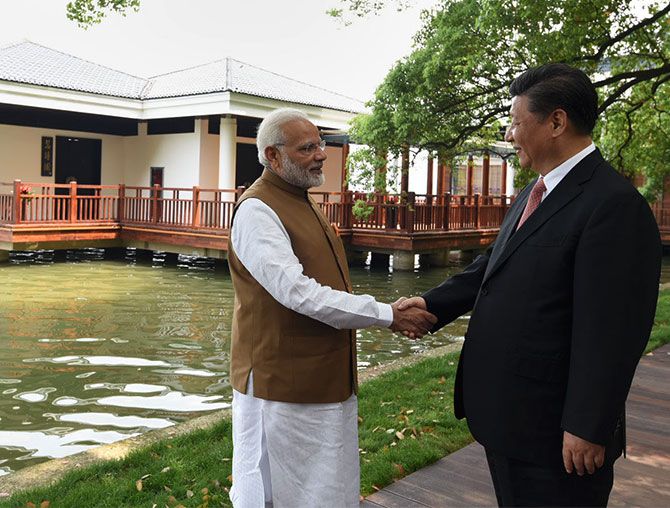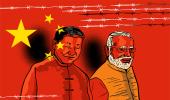'2019 is just a year away and Modi can do with some peace and tranquility on the external front.'
'There are risks, of course, but isn't Modi a risk taker?' asks Ambassador B S Prakash.

IMAGE: Prime Minister Narendra D Modi with China's Supreme Leader Xi Jinping in Wuhan, April 28, 2019. Photograph: Press Information Bureau
"So, what is the real outcome from the Wuhan summit?" asked my morning-walk friend, as we came together in the neighbourhood park.
Ours is a community of retired people from diverse backgrounds and everyday the conversations that reverberate in the park are varied: Encounter killings, on which a retired DG of police is holding forth; the latest bank scam on which many yesteryear bank managers are experts; the declining clout of Yadavs, a subject that excites former UP IAS officers and so on.
And every once in a while, I hold forth on foreign policy, being an ex-diplomat. Generally, it is about Pakistan or China and I do my best to act knowledgeable.
"The most important thing, I can tell you is not to talk of 'outcomes'," I said pompously.
In the last few days, I had read 31 opinion pieces, six from retired foreign secretaries and/or former ambassadors to China (many were both, showing the importance of China in our foreign ministry), eight from retired generals, about a dozen from the self-styled strategic community -- the one community that is flourishing with full rights of freedom of expression these days, and the rest from odd-balls or mavericks who too somehow find a presence in the revered editorial space.
In addition, I had watched some TV discussions, avoiding channels with intolerable decibel levels that cause a headache, or screens which struggle to accommodate eight experts at the same time that cause a squint-eye.
Nevertheless, I had heard some retired brigadiers with bristling mustaches, some academics with dull clothes and duller views, and some chirpy anchors with overwhelming confidence.
So, I tried to condense all that I had learnt in addition to my own insights from a life- time in diplomacy.
"To talk of outcomes was taboo from the very beginning. In fact, didn't you notice that the event was billed as informal even before the PM went to Wuhan?" I admonished.
"OK. What is the significance of the visit, then?" he persisted.
Aha, I had got my chance.
"Well, the most significant thing is that it happened at all," I replied magisterially.
I had read this mysterious formulation in several think-pieces. 'Existence precedes essence,' Sartre had declared decades ago and it had been deconstructed in my philosophy course to mean that always start with the brute fact of 'being'.
Becoming comes later. Wuhan event fell in this class.
The setting was more crucial than the 'reset'; the 'meet' itself more crucial than the result.
I could see that my friend was getting bored. I had to add some substance, pontificate a bit, if only to retain my status in the park.
"We can still talk about the effects, tangible and intangible, even if we do not mention outcomes," I said grandly and started.
"There are five questions," I began. I have learnt on the seminar circuit that to numerate your points sounds more authoritative.
First, what was the motivation for the summit?
To begin with the Chinese, they are famously inscrutable, but our experts had scrutinised their intentions.
China too, like everyone else, was perhaps troubled by Trump's unpredictability. Here, he was declaring trade wars one day and threatening real wars on another.
In such an uncertain world scenario, isn't it prudent to prevent India from tilting towards the USA and forming incipient quads with other allies of America like Japan and Australia?
A gesture to build trust and understanding with India may result in India continuing its policy of 'hedging', rather than give up all hope of a normal relationship with China.
Why not meet Modi with no promises, no strings attached and no guarantees?
Further, President Xi Jinping's pet project, the Belt and Road, will benefit by India's non-opposition, if not, support.
India could not be ignored either geo-strategically or economically. Why alienate it?
On India's part, even a hyper-nationalist and a believer in our great power potential knows the asymmetry of power -- economic, military -- between India and China.
After a series of difficulties and disappointments, some major and some minor -- border skirmishes, widening trade imbalance, support to Pakistan, CPEC, NSG, Masood Azhar -- a list of discords that have become a household litany in India, the idea of a meeting without an agenda is a tempting prospect, even if material results are uncertain.
Hence, optics and better atmospherics were sufficient motivation. Any positive understandings are a bonus.
Besides, 2019 is just a year away and Modi can do with some peace and tranquility on the external front.
There are risks, of course, but isn't Modi a risk taker? So much for rationale and motivation.
The second question is about what was achieved, the so-called deliverables. It was a good tactic that both sides did not get stuck in trying to come up with a 'joint communique'.
The issues between us are many, the differences substantive, and the challenge of finding a common ground onerous.
It may be more expedient to identify where we disagree and within that to agree on the core concerns than to expend energy on elusive agreements.
The contribution of Wuhan was the emphasis on 'strategic communication', a fancy word for a talk between the two 'big bosses'.
Hence, all the experts I read seemed to say -- 'so far so good', but let us see, what happens.
The third question was inevitably about who gained and who lost.
The process and the structure of the summit was designed to frustrate those who ask such questions.
A free-flowing, meandering and deliberately soft focus scenario without a final communique or a press conference made the question of wins and losses somewhat irrelevant. At least, for some time.
Finally, where do we go from here.
At one level, Modi and Xi are to meet again, soon, in June and that is likely to be a more relaxed meeting and the continuation of a process.
But in reality, only time will tell as to where the relationship is headed.
"And the fifth?" my friend asked me, having listened to me intently.
"Ah, the fifth. Sorry, I forgot," I ended lamely.
Too much thought and too little action? He asked me again crudely.
I recalled the preamble to the constitution of UNESCO: 'Since wars begin in the minds of men, it is in the minds of men that the defences of peace must be constructed.'
"What will happen in Karnataka?" he asked, wanting to change the subject. "Which way will Deve Gowda swing?" Karnataka is my home state.
"It is easier to speculate on what China may do," I replied with a sigh.
B S Prakash is a former Ambassador and a long-standing Rediff.com columnist.
You can read his columns here.










